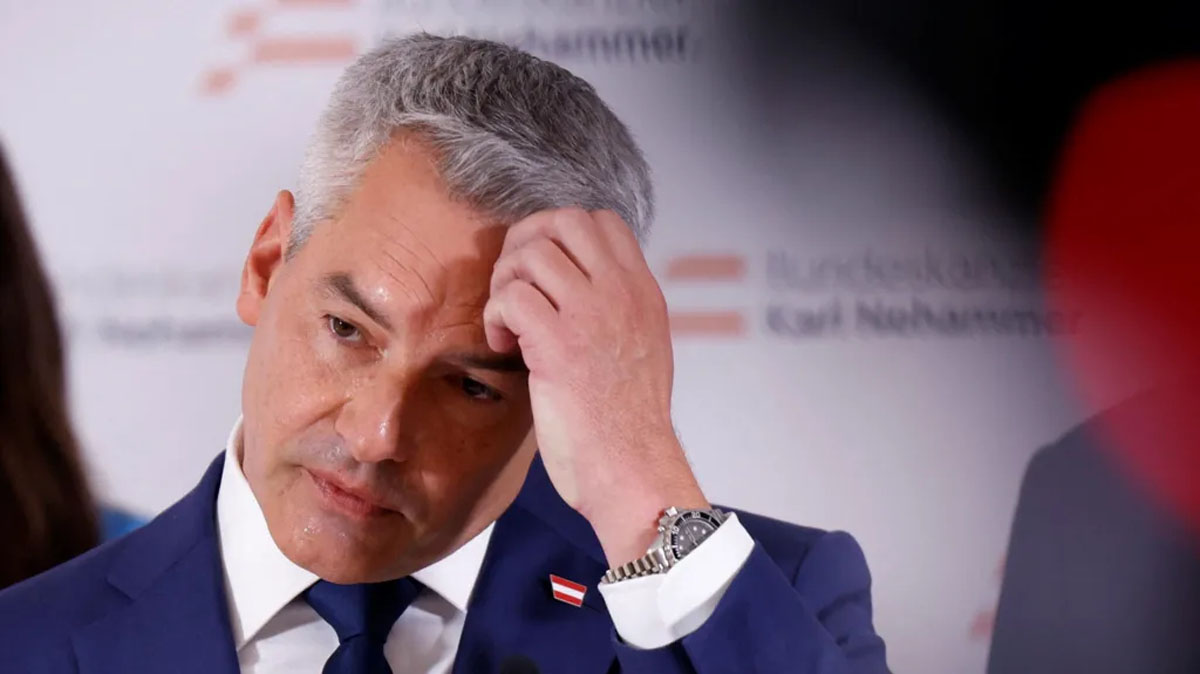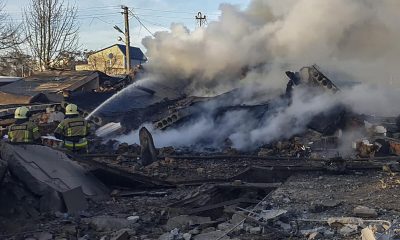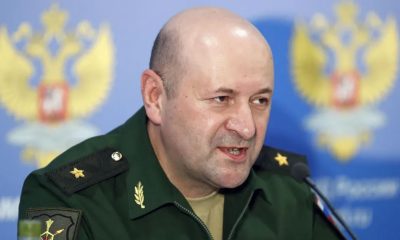International
Russia has lost up to 40% of troops sent to invade Ukraine — Official

Russia has lost up to 40 per cent of the units it sent into Ukraine when Moscow invaded its neighbour in February, the Ukrainian military’s general staff said on Wednesday.
The information could not be verified independently.
The area surrounding embattled Mariupol continued to face the most serious situation.
The Russian army was attempting a blockade of the city from the western and eastern fringes of the port city but was suffering “significant losses,” according to the bulletin.
Ukrainian authorities said some 20,000 people from Mariupol, on the Sea of Azov, managed to get to safety on Tuesday.
About 30,000 civilians nationwide were able to leave threatened areas on Tuesday, but a column with relief supplies for Mariupol is still being blocked by Russian soldiers, Ukrainian President Volodymyr Zelensky said.
In the Odessa region, Russian ships were shelling the Ukrainian coast but there was no attempt to land, Interior Ministry adviser Anton Herashchenko said.
Ukrainian and Russian representatives are set to resume their negotiations on Wednesday.
Zelensky said demands are starting to get more realistic while warning it would still take a while before Ukraine can be satisfied with talks.
Meanwhile, the prime ministers of Poland, the Czech Republic and Slovenia assured Zelensky of their solidarity and support during a visit to Kyiv.
They travelled to Kyiv by train in a gesture of support for Ukraine. (dpa/NAN)
Vanguard
International
China battles spike in new respiratory illness after COVID-19 pandemic

China battles spike in new respiratory illness after COVID-19 pandemic
People are once again wearing face masks as a result of a bizarre viral outbreak that is taking over several hospitals in China.
Videos of congested hospital units in China, parents waiting in lengthy lines with ailing children, and patients wearing face masks in crowded facilities have been making the rounds on social media.
Unverified reports of overcrowded crematoriums and burial homes have raised concerns and parallels to the early stages of the COVID-19 outbreak in China.
Local news outlets have attributed the outbreak to human metapneumovirus (HMPV), a virus that typically causes mild cold-like symptoms. However, Chinese health officials have not confirmed this as the cause, Dailymail reported.
The outbreak bears similarities to winter 2022/23 when mycoplasma pneumonia cases—referred to as “white lung”—spiked among children with weakened immunity due to prolonged lockdowns and school closures during the pandemic.
According to the Chinese Center for Disease Control and Prevention (CDC), the latest outbreak is largely driven by seasonal flu. Official data indicates that 30% of tests are positive for influenza, and one in seven hospitalized with severe respiratory illnesses has tested positive for the virus.
READ ALSO:
- Three Nigerian ladies in Saudi prison released after 10 months
- Burna Boy, Cubana Chief Priest feud rocks social media
- MaxAir suspends flight operations for five days
In its latest report, covering the week leading up to December 29, the Chinese CDC noted a rise in flu-like illnesses across the country. In northern provinces, 7.2% of outpatient visits were attributed to flu-like symptoms, a 12% increase from the previous week and higher than any corresponding week since 2021. In the south, 5.7% of outpatient visits were linked to flu-like illnesses, marking a 21% weekly increase, though still below 2022 and 2023 levels.
Videos showing overcrowded hospitals in Hunan province and other regions surfaced around New Year’s Eve. According to Aboluowang News, a US-based outlet covering China, a farmer in Hunan, identified as Mr. Peng, reported a surge in illnesses in his area.
‘A lot of people have caught colds, and most of them have [illness],’ he said in quotes translated to English.
‘About seven or eight people died this week in this area. Some were in their 50s, 60s, 70s, 80s and 40s.’
The news outlet also quoted a funeral director, Ms. Wang, who described long lines at her crematorium:
“There are long lines for cremation now,’ she said in translated quotes. Today, three VIP furnaces were opened.
“They were all burning and emitting a lot of smoke. It was terrible. If you don’t know about the crematorium, you would think it is selling New Year goods, just like holding a trade fair during the Chinese New Year.’
A Chinese video blogger, known as “Please Fei Ge,” shared his personal experience of falling ill after returning to their home province, which was not named, He said he and his wife both had a fever, body aches and headaches — and isolated from their children for three days to avoid transmitting the infection.
He was quoted saying: ‘This feeling is exactly the same as when I got “yang” back then. It’s very uncomfortable. If you still remember that feeling, wear a mask when you go out in crowded places.’
Last year, a surge in mysterious pneumonia cases among children led to similar viral videos showing packed hospitals in Beijing, China. At the time, Chinese authorities attributed the outbreak to a resurgence of diseases following the lifting of pandemic restrictions.
China battles spike in new respiratory illness after COVID-19 pandemic
International
UN accuses Israel of ceasefire breach

UN accuses Israel of ceasefire breach
The UN peacekeeping force in Lebanon accused Israel Saturday of a “flagrant violation” of the 2006 Security Council resolution that forms the basis of its November ceasefire with Hezbollah.
The statement from the UN Interim Force in Lebanon (UNIFIL) came as Hezbollah leader Naim Qassem warned the militant group’s patience with Israeli violations could run out before the end of the ceasefire’s 60-day implementation timeframe.
The fragile truce, which took effect on November 27, has been marked by mutual accusations of violations from both sides.
“This morning, peacekeepers observed an (Israeli military) bulldozer destroying a blue barrel marking the line of withdrawal between Lebanon and Israel in Labbouneh, as well as an observation tower belonging to the Lebanese Armed Forces immediately beside a UNIFIL position there,” the peacekeeping force said.
“The (military’s) deliberate and direct destruction of both clearly identifiable UNIFIL property and infrastructure belonging to the Lebanese Armed Forces is a flagrant violation of Resolution 1701 and international law.”
The force, which is represented on the panel overseeing the ceasefire’s implemenation, called on “all actors to avoid any actions, including the destruction of civilian property and infrastructure, that could jeopardise the cessation of hostilities”.
READ ALSO:
- Fulani herdsmen from Nigeria kill five Cameroonian soldiers, says MP
- You saved Nigeria’s democracy by defeating third term agenda, Tinubu tells Nnamani
- Air Force schools increase feeding fees by 200%
Under the terms of the ceasefire, the Lebanese army is to deploy alongside UN peacekeepers in the south as the Israeli army withdraws over a 60-day period.
Hezbollah is to withdraw its forces north of the Litani River — some 30 kilometres (20 miles) from the border — and dismantle any remaining military infrastructure in the south.
In late December, the UN peacekeeping force expressed concern at the “continuing” damage being done by the Israeli military in south Lebanon.
Detailing its latest air strikes in Lebanon on Thursday, the Israeli military said it was acting to remove any threat to Israel “in accordance with the ceasefire understandings”.
Qassem said Hezbollah had decided to show patience, but warned that would not last indefintely.
UN accuses Israel of ceasefire breach
International
Austria’s chancellor to quit as coalition talks collapse

Austria’s chancellor to quit as coalition talks collapse
Austria’s Chancellor Karl Nehammer says he will resign in the coming days, both as chancellor and party leader, after talks about forming a coalition government collapsed.
The chancellor said his party – the conservative People’s Party (ÖVP) – and the Social Democrats had failed to agree on key issues.
The liberal Neos, another party involved in the talks, also pulled out on Friday.
In September the far-right Freedom Party (FPÖ) won an unprecedented victory in Austria’s general election, but the other parties ruled out forming a coalition with the FPÖ’s leader Herbert Kickl.
The collapse of the talks could lead to the conservatives negotiating with the far-right, or to a new election taking place, analysts have said.
The Russia-friendly FPÖ has been in a ruling coalition before. It would likely welcome a new election as opinion polls suggest its popularity has grown further since September.
The FPÖ has said in a statement on X that three months have been lost by the coalition talks and adds that “instead of stability, we have chaos”.
READ ALSO:
- Biden to honour Messi, others with top US award
- Man steals goat for daughter’s naming in Ogun
- Privatise Port Harcourt, Warri refineries, PETROAN tells FG
The party has called for Social Democrat leader Andreas Babler to also resign and said President Alexander Van der Bellen bears “a significant share of responsibility for the chaos that has arisen and the lost time”.
The FPÖ won almost 29% of the vote in September’s election, the People’s Party came second with 26.3% and the Social Democrats third, with 21%.
There was a high turnout of 77.3% as Austrian voters took part in an election dominated by the twin issues of migration and asylum, as well as a flagging economy and the war in Ukraine.
The FPÖ’s Kickl promised to build “Fortress Austria”, to restore Austrians’ security and prosperity.
The party wants firm rules on legal immigration and it has promoted the idea of remigration, which involves sending asylum seekers to their original countries.
The FPÖ was founded by former Nazis in the 1950s.
Two days before last year’s general election vote some of its candidates were caught on video at a funeral where an SS song was sung.
The party later denied the song, dating back to 1814, had any link to “National Socialist sentiments”.
Austria’s chancellor to quit as coalition talks collapse
-

 metro2 days ago
metro2 days agoYouths beat Osun monarch for appointing Imam
-

 Business2 days ago
Business2 days agoPetrol price may crash to N500/litre, say marketers
-

 Business2 days ago
Business2 days agoMeta deletes AI accounts after backlash over posts
-

 metro3 days ago
metro3 days agoMosques should be research centres – Varsity don
-

 metro2 days ago
metro2 days agoYar’Adua stopped refinery sale to Dangote over due process, paltry amount – Falana replies Obasanjo
-

 Entertainment2 days ago
Entertainment2 days agoKano suspends Kannywood actress over indecent dressing, provocative content
-

 metro3 days ago
metro3 days agoEdo LG chairman, 8 councillors, defect to APC
-

 metro3 days ago
metro3 days agoDrunk police officer ‘frees’ 13 suspects to celebrate new year











